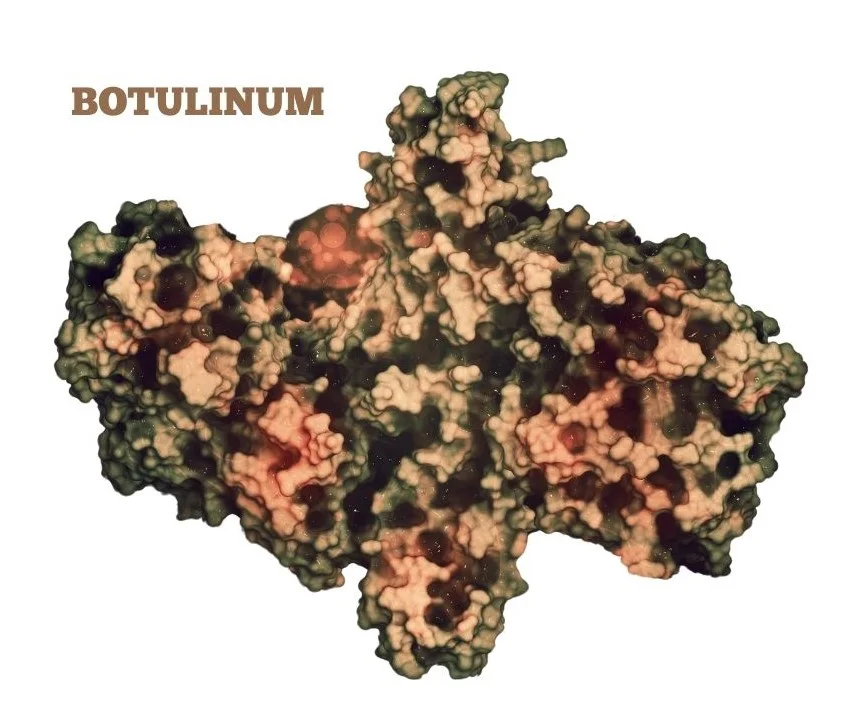Botulinum toxin, derived from the bacterium Bacillus botulinum, is a potent neurotoxin notorious for causing severe food poisoning, known as botulism.
In homeopathy, it is used to address symptoms resembling those of bulbar paresis, a condition affecting the nerves in the brainstem.

Table of Contents
ToggleSOURCE INFORMATION
Scientific Classification
- Kingdom: Bacteria
- Phylum: Firmicutes
- Class: Clostridia
- Order: Clostridiales
- Family: Clostridiaceae
- Genus: Clostridium
- Species: Clostridium botulinum
Origin
- Bacillus botulinum is commonly found in soil, water, and contaminated food, particularly improperly canned or preserved foods.
Interesting Facts
- Botulinum toxin is one of the most potent toxins known to humans, with even tiny amounts capable of causing severe illness.
- Despite its toxic nature, botulinum toxin has medical applications, including the treatment of various medical conditions such as muscle spasms, migraines, and excessive sweating.
DRUG PATHOGENESIS
- Botulinum toxin induces symptoms mimicking bulbar paresis, including eye symptoms such as ptosis, double vision, and blurred vision.
- It affects swallowing and breathing, leading to a choking sensation and difficulty in these vital functions.
- Weakness and uncertainty in walking, dizziness, and “blind staggers” may occur.
- Other symptoms include thickening of speech, cramping pain in the stomach, mask-like expression of the face due to weakness of facial muscles, and severe constipation.
KEY CHARACTERISTICS
EYE SYMPTOMS
- Ptosis: Drooping or falling of the upper eyelid, which can impair vision and cause a tired appearance.
- Double Vision: Seeing two images of a single object, often due to misalignment of the eyes.
- Blurred Vision: Reduced clarity or sharpness of vision, making objects appear fuzzy or out of focus.
DIFFICULTY IN SWALLOWING AND BREATHING
- Choking Sensation: Feeling of obstruction or difficulty in passing food or liquid down the throat, often accompanied by coughing or gagging.
- Weakness and Uncertainty in Walking: Reduced strength and coordination while walking, leading to unsteadiness and a feeling of uncertainty.
- “Blind Staggers”: A term used to describe a staggering or unsteady gait resembling that of a blind person, indicating severe impairment in mobility.
- Dizziness: Sensation of light-headedness, spinning, or loss of balance, often leading to a feeling of disorientation or unsteadiness.
- Thickening of Speech: Difficulty in articulating words clearly, resulting in slurred or muffled speech.
GASTROINTESTINAL SYMPTOMS
- Cramping Pain in Stomach: Sharp or dull abdominal pain associated with involuntary muscle contractions, often causing discomfort or distress.
FACIAL MUSCLES
- Mask-like Expression of Face: Loss of facial expression due to weakness or paralysis of facial muscles, resulting in a fixed or immobile appearance.
- Severe Constipation: Difficulty in passing stools, often accompanied by infrequent bowel movements, and straining during defecation.
These symptoms collectively illustrate the profound impact of botulinum toxin on both neurological and gastrointestinal functions, leading to significant impairment in vision, mobility, speech, and digestive processes.
DOSE
- Administered in higher potencies, according to homeopathic principles.
Frequently Asked Questions
What is the origin of botulinum toxin?
- Botulinum toxin is derived from the bacterium Bacillus botulinum, commonly found in soil and contaminated food.
What are the key symptoms of botulinum toxin poisoning?
- Symptoms include eye problems, difficulty swallowing and breathing, weakness in walking, gastrointestinal issues, and a mask-like expression of the face.
How is botulinum toxin used in homeopathy?
- It is used to address symptoms resembling those of bulbar paresis, particularly eye symptoms, difficulty in swallowing and breathing, and weakness in walking.
Meaning of Difficult Words
- Bulbar Paresis: Weakness or paralysis of the muscles controlled by cranial nerves originating in the brainstem.
- Ptosis: Drooping or falling of the upper eyelid.
- Neurotoxin: A toxin that acts specifically on nerve cells, often causing damage or dysfunction.
